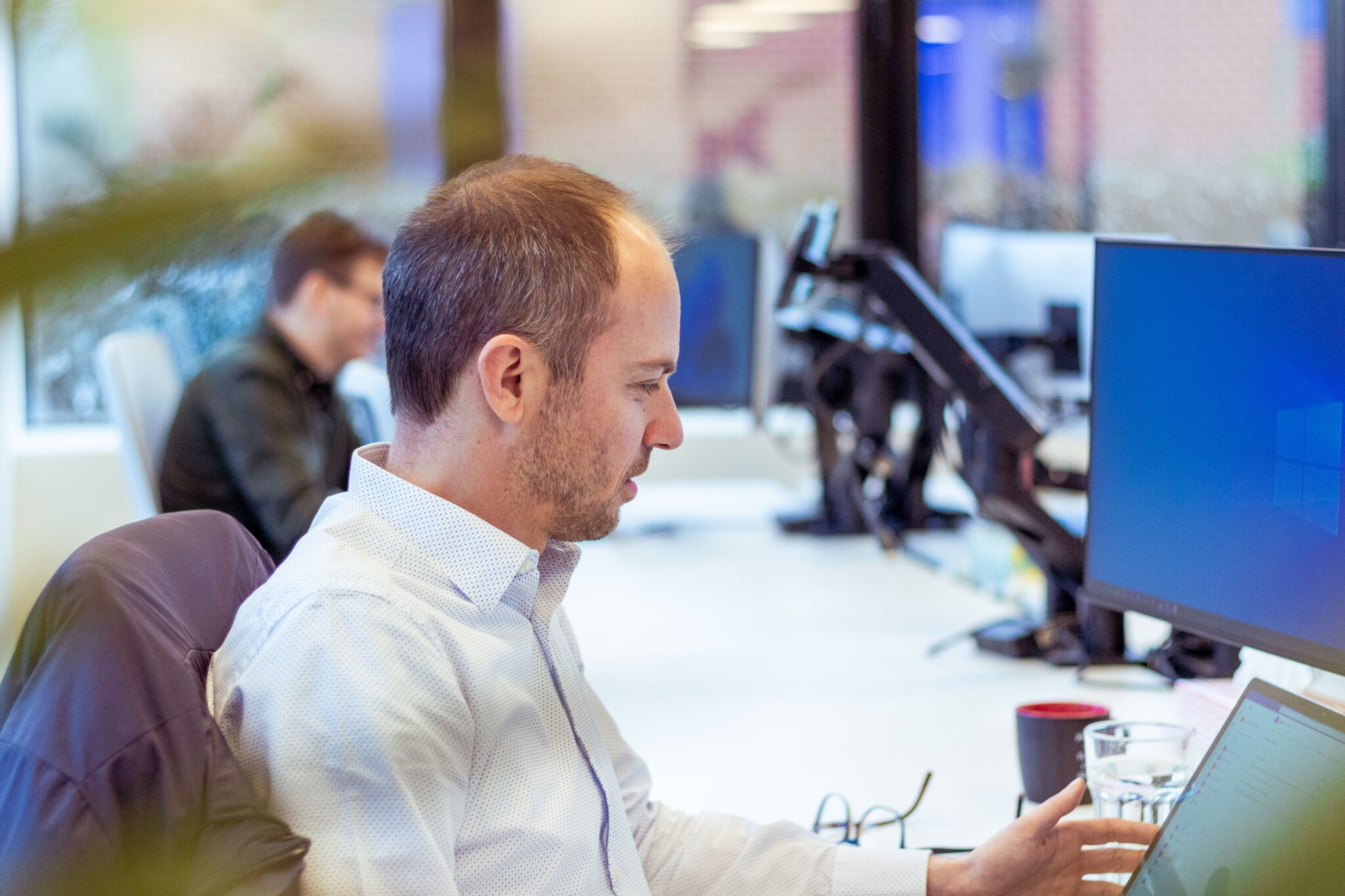Enterprising Entrepreneurship
25.02On paper, CloudFuel and Cronos aan de Leie are part of the same hierarchical structure. In reality, both companies offer a comprehensive package of managed services to their end-to-end customers. So how do these two companies keep their own identity? How do they carry out their partnership? How did they come up with their current concept? We had a conversation with Kim Fertinel (CloudFuel) and Neal van Maele (Cronos aan de Leie) to clear some things up.
How do CloudFuel and Cronos aan de Leie cooperate?
Neal: Obviously, each cooperation we have at Cronos aan de Leie differs from the last. The one constant is the fact that we keep learning from these kinds of collaborations. We always look at how we can help each other grow and create new opportunities. The key is to let the other party know exactly what you need in terms of financial or technical support.
This is an ongoing process, but we feel confident in saying that we’ve already built a solid foundation. We are currently busy further enhancing that partnership. Now that we have a lot of common ground, it is time to scale up and speed up our cooperation.
Kim: Before all this, we didn’t really know each other. Sure, we had added each other to our respective networks, but we hadn’t had any meaningful conversation yet. Suffice to say, that has changed thoroughly. Because of our shared expertise, we can quickly identify potential risks. This is one of the many reasons why this didn’t feel like a random experiment, but a carefully thought-out proposal with mutual benefits.
One year down the road, we have progressed leaps and bounds. Like Neal mentioned, we’ve built a solid base but now need to expand and solidify our cooperation. One of the key areas where we are progressing is managed services. We genuinely want to find a structure where each competence centre has its own role.
Cronos aan de Leie has proven themselves an ideal fit for CloudFuel in this area. We like to think of them as a catalyst of sorts. Because of their extensive reach, they have opened doors for us that would have remained closed otherwise.
How did you strike a balance in your partnership?
Neal: There’s no manual for these kinds of situations, but that’s what makes it interesting. Both of us like the dynamic side of entrepreneurship, and this partnership offers lots of that. Being part of the cluster has been a tremendous help. We’ve sent each other not only general aid and ideas, but also contacts and templates.
Even when we can’t help each other in those literal ways, we are constantly pushing the other in the right direction beneath the surface. The pragmatic attitude within the Cronos ecosystem really helps here. There’s a certain no-nonsense attitude when determining what works and what doesn’t. That’s how fruitful collaborations happen, but it requires visionaries like Kim and his co-managing partner Brecht.
Kim: Once that ball started rolling, there was no stopping it — not that we wanted to, anyway. The partnership is a large part of CloudFuel’s success and growth in the past year. As long as all noses are pointing in the same direction, you’ve got the potential on your hands to make something truly great happen. We also see this in virtual collaborations like the one with Noest.
What is the added value of being part of the Cronos aan de Leie cluster?
Kim: Cronos aan de Leie uses account managers to focus on West- and East-Flanders. This regional focus ensures a close connection to our customers. We not only know what they want, but also why they want it and how it fits into the bigger picture. The account manager also introduces the competence centres to the customers, which guarantees a lasting positive first impression. For us here at CloudFuel, that guarantee brings peace of mind and helps to establish a relationship based on trust.
There’s already some leads coming our way, but we want to further improve on lead generation. This is largely because the portfolio is relatively new, which is an immense challenge for account managers. It requires a keen eye to spot what a potential client really needs.
As CloudFuel, I think we have a responsibility to further educate salespersons at Cronos aan de Leie. Once they truly grasp what we can do for a customer, the leads will start coming in even faster. In the meantime, I would like to focus on hiring more enthusiasts here in Kortrijk. That way, the knowledge sharing can even happen during lunchtime.
Neal: From the cluster’s side, we are working hard at actively searching for these opportunities. We want to offer managed services to clients that are end-to-end and have really got to know us. Like Kim, I think there is a lot of potential in training our salespersons. It’s challenging to understand tailor-made software, especially when you factor in the currently limited portfolio and our commitment to building lasting relationships. Like all good things, this will take some time, but it’s an investment we are only too happy to make.
Kim, how does being part of the OECO group’s entrepreneurial traineeship program help this collaboration?
Kim: A lot of participants are there to work on some groundbreaking ideas, but I essentially attend to improve some aspects of my managing style and broaden my horizons. I think the program is particularly interesting because its use is twofold. It helps the group to spot talent, but it also helps to pull the attendees out of their comfort zones.
Neal: Exactly. Lots of people have great ideas, but nobody can do something on their own. Knowing what your project needs requires knowing yourself. The traineeship is immensely helpful in that regard. Soft skills are just as important as hard skills, and the best way to learn is by doing. I look at the program as a stepping stone for entrepreneurs to try out their ideas in a controlled environment. If something goes wrong, you don’t just hit a brick wall like in real life. Believe me when I say that it makes a vast difference.
To close things off, what’s your advice for starting entrepreneurs?
Kim: Don’t lose focus. Don’t deviate from your initial idea and don’t broaden it too much. That’s the way we work at CloudFuel as well. We deliberately stay true to our original mission, and it has helped us avoid distractions.
Neal: I agree. Set your mind to something, but accept that not everything will go to plan and keep your eyes on the prize. At a certain point, there will be a moment where you will need to make your vision tangible enough to execute it. The worst thing you can do is to rest on your laurels after that defining moment. You should constantly be fine-tuning your idea without losing sight of your initial mission.
The best advice I can give any upcoming entrepreneur is to search for a nurturing environment like the Cronos Groep. By alleviating most of your worries, this way of working allows you to spend your valuable time on innovating and your core business.
Did this interview pique your interest? Would you like to nurture those entrepreneurial ambitions? Feel free to contact us, and we will discuss the possibilities for you and your idea.





